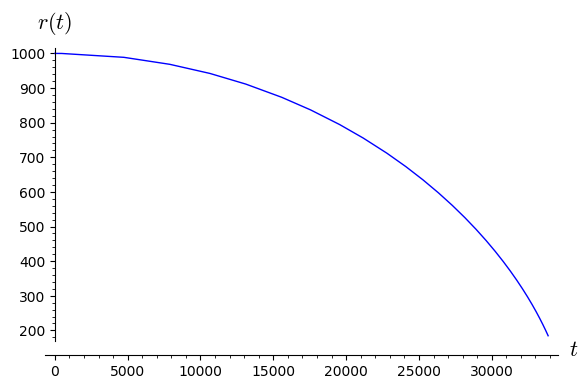Revision history [back]
 | 1 | initial version |
You can do it by setting the attribute terminal to True in the event function of solve_ivp:
from scipy.integrate import solve_ivp
def rhs(t, (r, v)): # v stands for dr/dt
return (v, -1/r^2)
r_min = 200.
def small_radius(t, (r, v)):
return 0 if r < r_min else 1
small_radius.terminal = True
t0, r0, v0 = 0, 1000., 0 # initial conditions
t_max = 50000
sol = solve_ivp(rhs, (t0, t_max), (r0, v0), events=small_radius, rtol=1e-8)
sol.message
gives
'A termination event occurred.'
You can plot the obtained solution by
line(zip(sol.t, sol.y[0]), axes_labels=[r'$t$', r'$r(t)$'])
and check that it indeed stops at r=r_min:

 | 2 | No.2 Revision |
You can do it by setting the attribute terminal to True in the event function of solve_ivp:
from scipy.integrate import solve_ivp
def rhs(t, (r, v)): # v stands for dr/dt
return (v, -1/r^2)
r_min = 200.
def small_radius(t, (r, v)):
return 0 if r < r_min else 1
small_radius.terminal = True
t0, r0, v0 = 0, 1000., 0 # initial conditions
t_max = 50000
sol = solve_ivp(rhs, (t0, t_max), (r0, v0), events=small_radius, rtol=1e-8)
sol.message
gives
'A termination event occurred.'
You can plot the obtained solution by
line(zip(sol.t, sol.y[0]), axes_labels=[r'$t$', r'$r(t)$'])
and check that it indeed stops at r=r_min:

For more details, see the documentation of solve_ivp.
 | 3 | No.3 Revision |
You can do it by setting the attribute terminal to True in the event function of solve_ivp:
from scipy.integrate import solve_ivp
def rhs(t, (r, v)): # v stands for dr/dt
r'' = -1/r^2 rewritten as the system
return (v, -1/r^2)
-1/r^2) # r' = v, v' = -1/r^2
r_min = 200.
def small_radius(t, (r, v)):
return 0 if r < r_min else 1
small_radius.terminal = True
t0, r0, v0 = 0, 1000., 0 # initial conditions
t_max = 50000
sol = solve_ivp(rhs, (t0, t_max), (r0, v0), events=small_radius, rtol=1e-8)
sol.message
gives
'A termination event occurred.'
You can plot the obtained solution by
line(zip(sol.t, sol.y[0]), axes_labels=[r'$t$', r'$r(t)$'])
and check that it indeed stops at r=r_min:

For more details, see the documentation of solve_ivp.
